Shame, guilt and self-blame: Why sex assault victims don’t come forward
Ad
Women
Shame, guilt and self-arraign: Why sex activity assault victims don't come frontward
Sex crimes in Singapore go on to be nether-reported, despite increasing awareness. CNA gets an sectional look at the reasons why and how the authorities are making the reporting process less daunting for survivors.
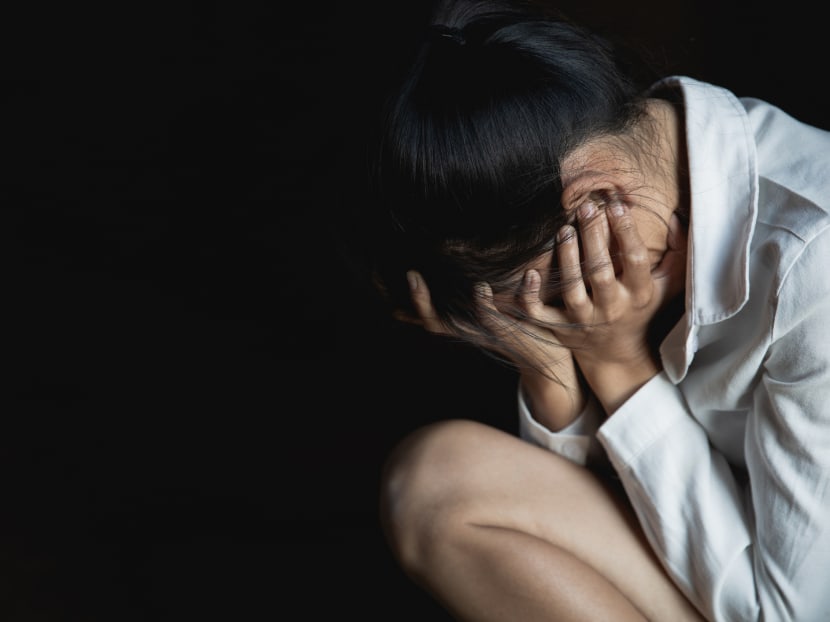
Fifty-fifty if time has lapsed since a sexual assault has happened, the rape report is withal assessed with the same rigour and scrutiny by the Attorney-General's Chambers. (Posed photo: iStock/Tinnakorn Jorruang)
Information technology took 36-year-old Elizabeth Teo nearly 15 years to come to terms with an abusive relationship she was coerced into when she was just nineteen. The man was xx years older than her – she saw him as a spiritual mentor, and they met oftentimes to pray together then.
"1 day during one of these meetings, he grabbed my hand and said, 'You caused me to fall in beloved with yous. Now you cannot become out of the human relationship'," recalled Teo.
With that, her three-and-a-half yr nightmare began. Teo alleged that between 2004 and 2007, the man would take reward of her almost daily when they met in his car.
"He would pry my lips open and teeth open … with his natural language and then explore my oral cavities and kiss me heavily," she said. She claimed that the incidents escalated on a few occasions.
"He digitally penetrated me maybe three or 4 times … When it happened, I would look at the religious symbol hanging on his rearview mirror, and I would simply pray to God, delight have my soul away so whatever he was doing, he was doing to my body," Teo said.
Teo said the relationship eventually ended when "his conscience got the ameliorate of him".
But she never spoke upwardly against her declared aggressor. "I was really aback because he was married … I blamed myself for the sexual abuse, that I didn't button him abroad hard enough, I didn't run abroad hard enough. I didn't say no loud plenty," Teo said.
Her turning betoken came in 2018, when a therapist helped her see she was not at fault for what happened. She filed a police report in July that twelvemonth.
"I knew there might be a take a chance that nothing is going to happen … Just I don't know whether he has washed it to any other girls, and information technology's about protecting other people besides... And I wished he knew the hurting he put me through," she said.
Later on one-and-a-half years of investigations, the government decided not to take further action in Teo'southward case. While that decision was hard to accept, she said she did not regret making the law report.
"At least he knows that I wanted to pursue the case, hopefully that made him scared for a while," she added.
"NOT UNCOMMON" FOR VICTIMS TO LODGE REPORTS Later: AGC
Teo's experience with cocky-blame and guilt is not a unique 1. Managing director of the sex crimes cluster at Chaser-General's Chambers and Deputy Public Prosecutor Ng Yiwen said that in his feel, it is "non uncommon" for victims of sex activity crimes to come forward "months or years later" after an incident due to such reasons.
Regardless of the time the victim took to come forrard and report, AGC will still treat the example as per whatever other case that comes before us, and nosotros will appraise it with the aforementioned amount of rigour and scrutiny.
Ng acknowledged that the time lapse makes it more hard to prosecute such a case as forensic testify would accept been lost due to the passage of time, and witnesses' memories – including the victim'southward and accused'southward – may also be impaired.
Despite the challenges, he emphasised that a belatedly study is "not absolutely fatal to a successful prosecution".
"Regardless of the time the victim took to come forwards and report, AGC will still treat the case as per any other case that comes before us, and we volition assess it with the same amount of rigour and scrutiny. If we are satisfied that the example meets the evidential threshold, and there are no countervailing considerations, nosotros can still prosecute the case," said Ng.
Ng said that as many sex activity crimes are often committed in private or isolated settings with no eyewitnesses, very frequently, the only evidence is the recollection of the victim – which would have to be "unusually disarming".
While there is no hard and fast dominion on what meets that threshold, Ng said the court will look at a few factors – like the victim's demeanour when testifying on the stand, whether his or her evidence is consistent with other pieces of evidence similar psychiatric or gynaecologist reports.
"To give you a perhaps more direct example, if a victim says he or she was at a certain place at a particular time during the incident, and in that location's some evidence to advise that to prove and corroborate this point, that is something the court will wait at as well," said Ng.
"I Eventually SAW More LIGHT THAN DARKNESS"
To ensure that cases can withstand scrutiny in courtroom, regime have to brand sure investigations are thorough – a procedure which can exist exhausting for victims every bit they are often asked to recount their intrusive experiences in detail.
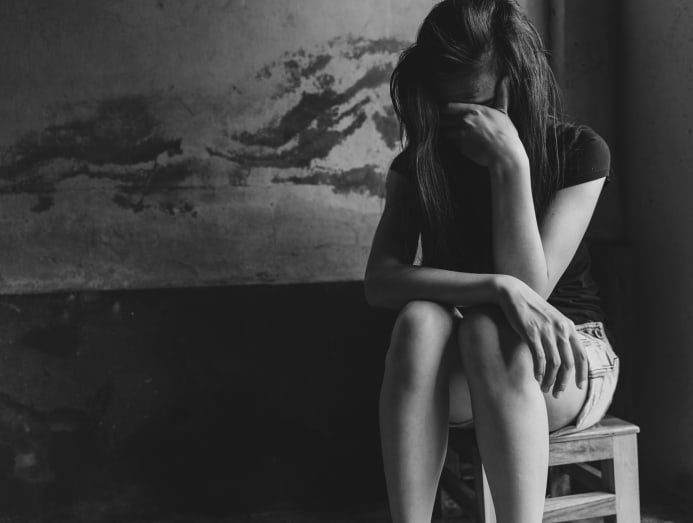
20 ii-year-old "Amelia" stuck through the procedure to see justice served on her perpetrator.
He was sentenced to 24 years' jail later pleading guilty to sexually assaulting her for six years, beginning when she was eight years quondam. He would sneak into her room ii to three nights a calendar week to violate her, and her ordeal simply ended in 2022 after the man was arrested and jailed for drug offences.
"Amelia" had chosen to keep mum virtually the assaults, only things came to calorie-free in 2022 when she suffered a mental breakup. The then-18-year-old teen revealed the corruption to the Establish of Mental Health, and they referred the case to the police force.
"Amelia" recalled that she broke downwards during her first interview with the law.
"It was very pressurising ... I remember them showing me (a picture) of his face, just to confirm he was the guy. It defenseless me off guard considering I haven't seen him for a long time. The investigation officeholder also asked me things very explicitly – did he kiss you? Did he touch you? Where did he touch you?," she said.
For the side by side two years, "Amelia" was also required to see the police force oft to help with investigations.
"The more I told them, the more than they questioned me. They even asked me how my house looked like. I recall having to draw a bird's eye view of my room, and where the bed and door was," she added.
But looking back, she did non regret speaking up.
"At the starting time of the process I was very tired and I wanted to give up. In the middle, things were starting to look upward, considering a lot of people were encouraging. I saw more calorie-free than darkness," she said.
WHY QUESTIONS ON A VICTIM'S ATTIRE ARE NECESSARY: Constabulary
About 9,200 police reports on sex crimes were fabricated between 2022 and 2020, co-ordinate to statistics from the Singapore Police Force. These include reports of rape, sexual assault by penetration, outrage of modesty, and sexual offences involving children and vulnerable victims.
Cases involving possible non-consensual penile-vagina, penile-anal, or penile-oral penetration will be referred to the Serious Sexual Criminal offense Branch (SSCB).
The department dealt with 348 rape cases last year, compared to 281 cases in 2019. Near of the rape cases involved perpetrators known to the victims – like acquaintances, family unit members, relatives or friends.
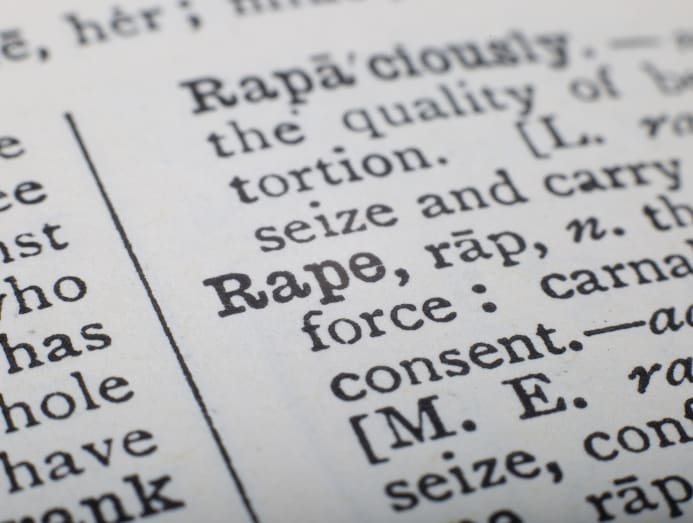
The Singapore Police Force spoke exclusively to CNA to shed light on why some intrusive questions have to be asked.
Deputy Superintendent of Police force (DSP) Vivien Lim, deputy head of the Serious Sexual Crime Branch, best-selling that some of the questions asked appear victim-blaming, but she seeks the victims' agreement, as they are necessary for investigations
"(Questions on) the victim's attire besides as the perpetrator's attire … are being asked for the purposes of identification and for CCTV footage as well as other circumstantial prove.
"We likewise include questions on the victim'southward sexual history, to permit our officers to accept a better understanding when it comes to the estimation of the results that nosotros obtain from the forensic medical examinations," said DSP Lim.
Our questions practice not impute any responsibleness to the victims for the sexual crimes that take been committed against them.
The law could also probe into the human relationship between the alleged perpetrator and the victim to have a meliorate agreement of the circumstances leading to the sexual assail incident. DSP Lim says this is to assist police institute further leads into the instance and gather more evidence.
Merely on the police's part, DSP Lim said that officers receive specialised training to ensure that due care and empathy are shown to the victim during the course of the interview and then they don't become re-traumatised. Victims tin can as well analyze with their officers on why some questions are asked.
"Our questions do not impute any responsibleness to the victims for the sexual crimes that have been committed against them," emphasised DSP Lim.
GATHERING OF FORENSIC EVIDENCE
Efforts have also been put in identify in recent years to brand the reporting process less daunting for victims. One case is the setting upwardly of the One-Stop Corruption Forensic Examination (OneSAFE) Centre at Police Cantonment Circuitous.
It allows victims to undergo forensic and medical examinations in a private space, instead of being taken to a public infirmary. Doctors from the Singapore General Hospital, National Academy Infirmary, and KK Women'south and Children'south Hospital volition be activated to attend to victims of sexual crimes at the OneSAFE Centre.
As of July, it has been used 180 times since it was set upward in 2017.
The Law too showed CNA the contents of the Sexual Assault Examination Kit – more commonly known as a rape kit – which is used to collect physical evidence from victims whose assaults had happened in the last 72 hours prior to reporting.
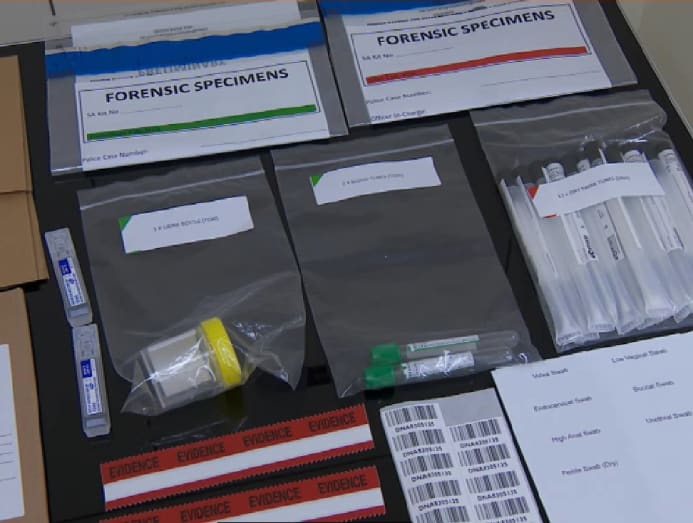
During the forensic examination, the victim will be asked to stand up on a piece of newspaper to collect trace evidence as they remove their clothing. This type of evidence could include a perpetrator's pubic pilus, which could be plant on a victim's genital area.
"Information technology depends on where the sexual assault has happened. And then if it happened in a forested area, or on the footing where there's the presence of soil, sometimes soil may fall," said DSP Lim.
At that place are also diverse dark-brown numberless to collect a victim's wear for further analysis. DSP Lim says the SSCB has extra habiliment including disposable undergarments for victims to alter into.
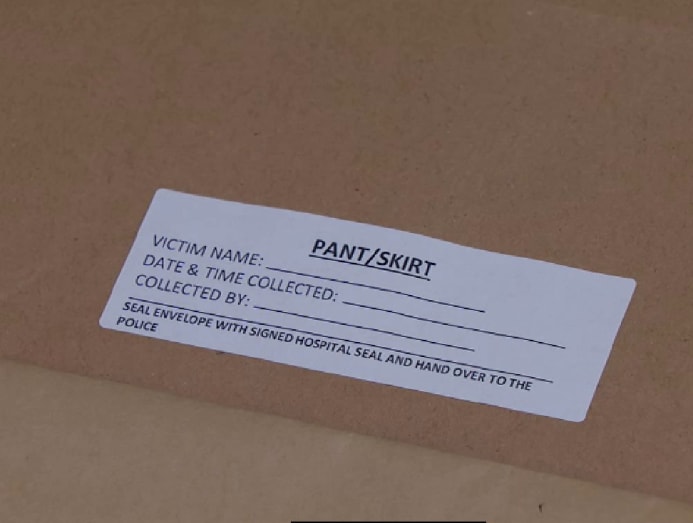
The kit also consists of 12 swabs for areas like the vagina, anus and mouth – which are administered depending on the type of attack that has occurred. Urine and blood could too be nerveless from the victim to test for blood alcohol levels or drugs, every bit some victims may have been intoxicated during the assault, added DSP Lim.
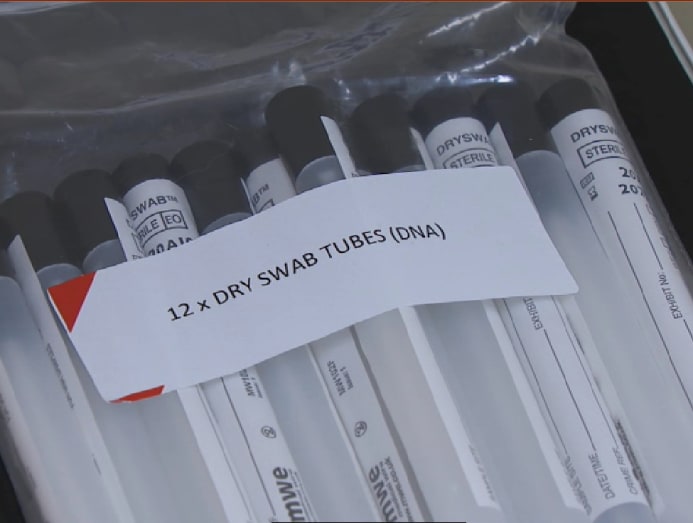
The samples are so sent to the Wellness Sciences Say-so for assay. "Information technology nonetheless takes some time because… they will look for the Deoxyribonucleic acid of the victim as well every bit the perpetrator," said DSP Lim.
Even though the rape kit can only be administered within 72 hours of an assail, DSP Lim said at that place is notwithstanding value in victims coming forward to lodge a written report even if fourth dimension has lapsed or if the victim is of the view that they may not have sufficient prove to bear witness their instance.
"At the end of the day it'south the duty of the police to institute the required evidence and to attempt find out the truth," said DSP Lim.
CNA Women is a new section on CNA Lifestyle that seeks to inform, empower and inspire the modern woman. If you take women-related news, problems and ideas to share with us, email CNAWomen [at] mediacorp.com.sg .
Recent Searches
Trending Topics
Source: https://cnalifestyle.channelnewsasia.com/women/sexual-assault-reporting-rape-singapore-280421


0 Response to "Shame, guilt and self-blame: Why sex assault victims don’t come forward"
Post a Comment